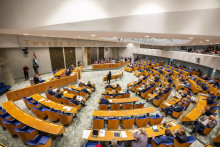As director of international education in the faculty of Behavioural Sciences, van Vilsteren has overseen the program initiated in Cochabamba, Bolivia for the past 20 months. Cochabamba is one of 10 public universities in Bolivia and serves some 54,000 students. The day he arrived turned out to be a bit more chaotic than planned.
On June 6 President Carlos Mesa resigned and fled the capital of La Paz after a month long protest calling for reforms including the nationalisation of gas companies and increased representation for indigenous people; an unstable power vacuum and the threat of civil war was the result. `My planned return the past Thursday was moved forward on strong recommendation of the Dutch Embassy in La Paz because of the very threatening political situation that resulted from the withdrawal of president Mesa the previous Monday, the day I arrived in Bolivia. After the appointment of the new ad interim president Rodriguez the situation cooled down and I could leave,' explains van Vilsteren from his office in Cubicus.
The trip was to attend the defence of 14 master's theses and ended up taking place at van Vilsteren's hotel due to the closing of the university facility; the normally lengthy sessions (up to five hours per candidate,) were shortened to make time for all the defences. `Changes in the political situation and changes in the university system are tightly intertwined; there is a close relation between political and educational development in Bolivia,' states van Vilsteren. As the conclusion of a long and ambitious project, the promotion of the students was already an exciting event; the recent political drama added yet another dimension to the journey.
`Originally, we were hesitant to go ahead with training on site in Bolivia rather than bringing the candidates here for training; I was not confident that they would be given the time necessary to fulfil the requirements; because of the large number of students, instructors have a very full schedule already' says van Vilsteren. `In one case there were 11 teachers for some 5000 students; but they found a way to complete the program anyway.' The fourteen candidates from diverse faculties were awarded the University of Twente master's level diploma in `Innovacion en la Educacion Superior'.
Van Vilsteren was impressed with the desire of the candidates; many Bolivian students are really motivated by their background: they want to progress and improve their country and their lives. `What happens in these cases is that these students really have the advantage of a clean slate, starting from scratch in a way. In other environments perhaps you are trying to sharpen skills that professors or administrators feel they are already proficient in; that is not the case with this program—they concentrate on what is applicable tomorrow.' Some of the thesis topics included information technology in education and e-learning systems as well as the use of portfolios as an alternative testing method. `These were all applicable and implemented projects; the computer science group has already received a Swedish grant for experimenting with computer supported education,' says van Vilsteren proudly. Latin America has some built in advantages for this sort of project according to van Vilsteren: `There is an admirable knowledge base already in place and a comparatively complex university system with a long tradition; their academic level is already quite high. The challenge was the facing the cultural perspective of theoretical research as the paramount kind of academic work,' explains van Vilsteren. `I think we did a good job of showing that addressing real, concrete problems within your faculty and analyzing the results after implementation is really academically worthwhile.' Regardless of the chaotic situation, van Vilsteren is hopeful for the future of the educational program; now that the candidates have matriculated, the training should be exponential as the teaching program continues. The master's training will be implemented in the national university system. Van Vilsteren says hopefully, `I think we've done something good there, a good effort.We are also involved in more of these kinds of projects in Mozambique, Ethiopia and Ghana because of our experience in Bolivia.'








